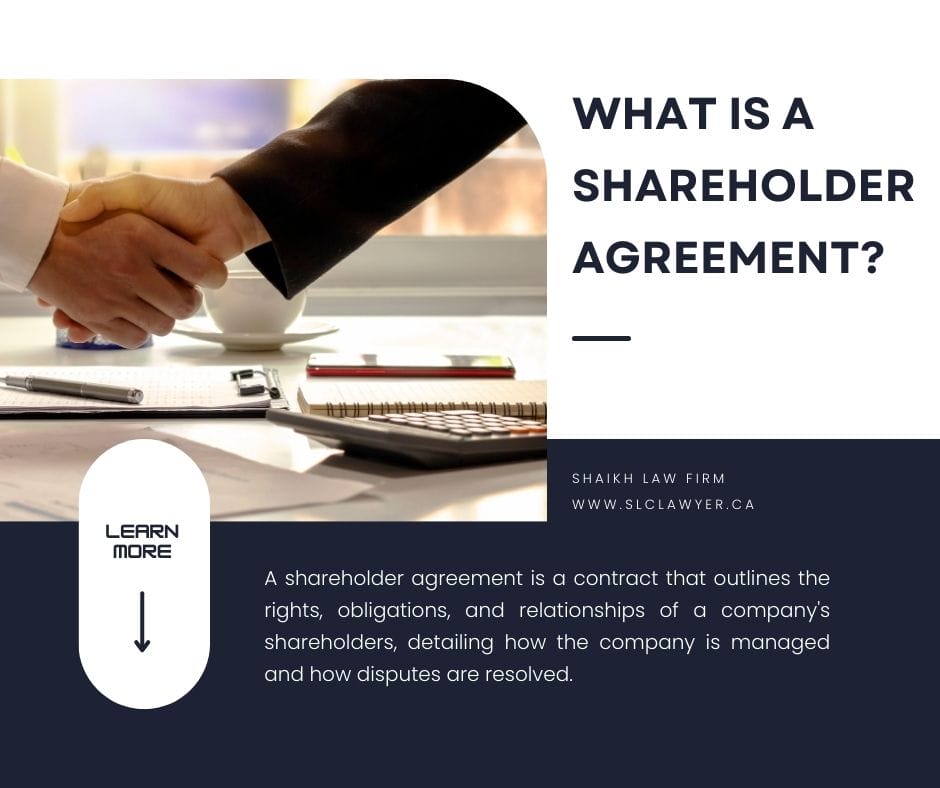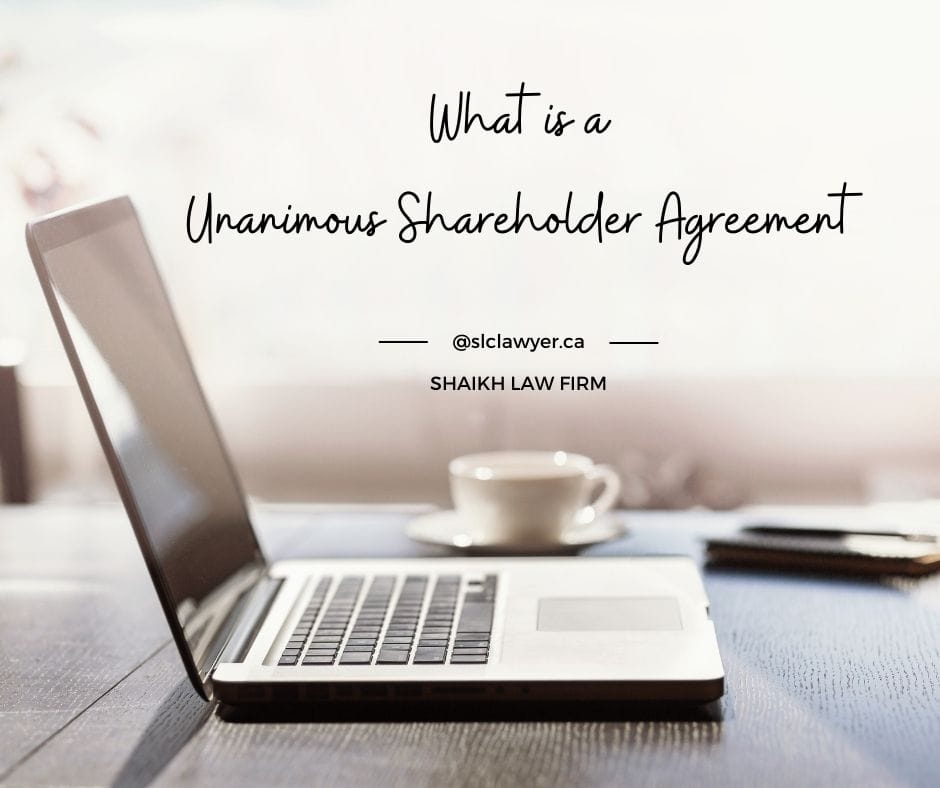Shareholder Agreement: The Ultimate Guide is a comprehensive guide designed to navigate the complexities of shareholder agreements in Ontario Canada.
Whether you’re an entrepreneur, a seasoned business owner, or a curious investor, understanding the nuances of shareholder agreements is crucial for safeguarding your interests and ensuring the smooth operation of your company.
Here, we’ll cover everything from the basics to the intricate details, providing you with the knowledge needed to make informed decisions.

A shareholder agreement, at its core, is a contract between some or all of the shareholders of a company. It governs the shareholders’ relationship with each other and with the company, outlining their rights and obligations, the management of the company, and provisions for the resolution of any disputes that may arise. Unlike the company’s articles of association or bylaws, which are public documents filed with the government, a shareholder agreement in Ontario is a private contract that offers an additional layer of governance tailored to the specific needs of the business and its owners.
A shareholder agreement serves multiple purposes, the most significant of which is to ensure that the rights and obligations of shareholders are clearly defined and protected. It provides a framework for the operation of the company, detailing processes for decision-making, dispute resolution, and the handling of shares. This agreement is particularly valuable in closely held companies where the number of shareholders is limited and the involvement in management is significant.

A Unanimous Shareholder Agreement (USA) is a unique legal contract among all shareholders of a corporation. It allows shareholders to assume certain rights, responsibilities, and powers typically held by the board of directors, effectively altering the company’s governance structure. For a USA to be valid, it requires the unanimous consent of every shareholder, making it binding on both current and future shareholders of the company. This agreement provides a framework for direct shareholder control over specific decisions, offering a tailored approach to corporate governance. By transferring significant management decisions from the directors to the shareholders, a USA empowers shareholders to directly influence the strategic direction and operations of the company, ensuring that all shareholders are aligned in their vision for the corporation’s future.
Unanimous shareholder agreement vs shareholder agreement:
While both Unanimous Shareholder Agreements (USAs) and standard Shareholder Agreements (SAs) serve to outline the rights and obligations of shareholders within a corporation, they differ significantly in scope and impact.
A USA requires the unanimous consent of all shareholders and can transfer specific management powers from the board of directors to the shareholders, directly affecting the company’s governance structure. In contrast, a SA can be entered into by any number of shareholders without needing unanimous consent and typically focuses on specific aspects of the shareholders’ relationship, such as share transfer restrictions and dividend policies, without altering the fundamental governance framework established by the board.
Essentially, USAs offer a more comprehensive approach to modifying corporate governance by involving all shareholders, whereas SAs provide flexibility to address particular concerns among shareholders without the need for unanimous agreement.

A shareholder agreement is essential for a company’s smooth running and management. Beyond its fundamental role in preventing disputes, it serves several critical functions that protect the company and its shareholders in both the short and long term.
Preventing Disputes
By clearly outlining the rights and responsibilities of shareholders, a shareholder agreement in Ontario minimizes the potential for conflict. This clarity is crucial in ensuring that all parties understand their roles within the company, thereby reducing the likelihood of disputes.
Clarifying Decision-Making
The agreement sets forth the procedures for making decisions that affect the company, ensuring that all shareholders know how such decisions are made. This includes detailing voting rights and quorum requirements, which are essential for the company’s smooth operation.
Protecting Minority Shareholders
It can include provisions that protect the interests of minority shareholders, preventing their rights from being overridden by majority shareholders. This protection is vital for maintaining equity and fairness within the company.
Facilitating Share Transfers
The agreement regulates the transfer of shares, including provisions for buy-sell agreements, first right of refusal, and drag-along or tag-along rights. These provisions are crucial during events like the death of a shareholder or an offer to buy the company, ensuring that the company’s and shareholders’ interests are protected.
Enhancing Operational Efficiency
It establishes precise management and operational practices guidelines, enhancing the company’s operational efficiency. This is particularly important in avoiding operational deadlock and ensuring the company can continue operating smoothly without being hampered by indecision or conflict among shareholders.
Facilitating Financial Transactions
A well-drafted shareholder agreement makes the company more attractive to potential investors by providing a clear governance structure and protecting shareholder investments. It outlines the terms under which new shares can be issued and existing shares can be sold, providing a clear path for future capital raises and liquidity events.
Planning for the Future
The agreement plays a crucial role in succession planning and handling unforeseen events, with provisions related to the death, disability, or divorce of a shareholder. These provisions help prevent personal matters from negatively impacting the company’s operations or leading to forced sales.
Maintaining Confidentiality and Competitive Advantage
Confidentiality clauses within the agreement protect sensitive company information, maintaining the company’s competitive advantage. Non-compete and non-solicitation clauses prevent shareholders from starting competing businesses or poaching employees, further safeguarding the company’s interests.
Essentially, a shareholder agreement in Ontario acts as a comprehensive safeguard, ensuring that the company operates smoothly and that shareholders’ interests are protected. It is a critical tool for managing expectations and providing stability and predictability in the company’s governance, making it an indispensable element of corporate governance.

Understanding the anatomy of a shareholder agreement is crucial for anyone involved in the management or ownership of a company; below are the critical components of a shareholder agreement in Canada.
Decision-Making and Governance
Share Ownership and Transfer
Financial Matters
Dispute Resolution
Succession and Exit Provisions
While templates for shareholder agreements can offer a reasonably priced starting point, relying solely on these generic documents to govern the complex relationship between shareholders and the company can quickly become problematic.
Risky of costly litigation
Trying to save a bit of money now with a free or $50 template can lead to huge costs later. When disputes arise, what you saved on a template can be dwarfed by the thousands you might spend on legal battles.
Lack of Customization
Templates are inherently generic and may not address your company and its shareholders’ specific needs, objectives, or concerns. This one-size-fits-all approach can leave significant gaps in the agreement, potentially leading to disputes and operational inefficiencies.
Serious Legal Compliance Issues
Shareholder agreement templates may not be up-to-date with your jurisdiction’s latest legal regulations and requirements. An outdated or non-compliant template could expose your company to legal risks and liabilities.
Overlooking Key Provisions
Without the guidance of a legal professional, crucial provisions tailored to your company’s situation might be omitted. This oversight can result in inadequate protection for minority shareholders, unclear dispute resolution mechanisms, and ambiguous exit strategies.
Our business lawyer brings a wealth of experience and a deep understanding of corporate law to the table, ensuring that your company’s shareholder agreements are tailored to your specific needs and compliant with the latest legal standards.
With a keen eye for detail and a proactive approach to anticipating potential future disputes, our lawyer works diligently to safeguard your company’s interests.
By choosing our legal services, you’re investing in peace of mind, knowing that your shareholder agreements are crafted with precision, expertise, and a commitment to your business’s long-term success.

Investing in a shareholder agreement is a crucial step for any corporation looking to secure its governance and shareholder relations. A simple shareholder agreement costs $1440 + HST. This investment not only ensures the legal integrity of your agreement but also provides peace of mind, knowing that your corporation’s and shareholders’ interests are protected and clearly defined.
Our shareholder agreement package includes:
This package is designed to provide a solid foundation for your company’s shareholder relations, offering a clear, legally sound agreement that supports your business’s growth and stability. Additional services beyond the included four hours of work are available and can be discussed during your initial consultation.
Investing in a professionally drafted shareholder agreement is an investment in your company’s future. Contact us today to begin the process of securing your corporation’s governance with a tailored shareholder agreement.

15 Minutes
(905) 795 7757
info@slclawyer.ca
(905) 795 1271
Etobicoke, Ontario
Ph: (905) 795 7757
PH: (647) 812 6938
Fax: (905) 795 1271
E-mail: info@slclawyer.ca
Multiple Meeting Locations